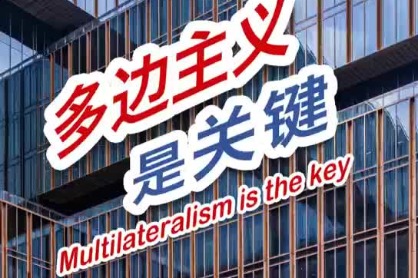Leveraging late-mover advantages
As the world governance system is being reformed in a globally divided landscape, China should contribute Chinese wisdom and play a bigger role to find solutions


The structure of global industry chains is becoming more localized, regionalized and diversified. During earlier readjustments of the global supply chains, late-developing economies were seen to take over industries relocated from developed economies through cheap labor and high demand created by demographic dividends. The United States, Japan, Singapore, the Republic of Korea, the Hong Kong Special Administrative Region and Taiwan island are all beneficiaries of the earlier rounds of industry chain restructuring wherein they overtook more advanced economies.
Amid heightened uncertainties for the global economy, the restructuring of global supply chains is often accompanied by international competition. International trade and economic rules have a significant impact on late-developing economies' participation in the global supply chain. Trade protectionism and geopolitical conflicts increase the risks associated with late-developing economies' absorbing industries transferred from developed economies, threatening the steady restructuring of global supply chains.
Despite their large number, the small and medium-sized enterprises in China are sensitive to the economic environment and vulnerable to risks. As a result, the country's industry chain faces high risk of disruption. Meanwhile, the country has not yet built a unified national market. More efforts are required to eliminate local protectionism and market fragmentation, and to remove regulations and practices that hinder market integration and fair competition.
In addition, in order to take the lead in the transformation of the global industry chain, countries are proactively taking part in the reshaping of global governance rules, and are implementing policies to enhance the autonomy of their own industry chains, further strengthening regionalism and the localization of trade and investment and fueling the restructuring of the global industry chain.
China's voice in the multilateral trade system is still weak. It is not proficient in practicing global trade rules, and needs to elevate the level of regional trade agreements it signs with other countries. It also needs to push its higher-level opening-up.
China must thus seize the opportunities presented by the global industry chain restructuring to realize its upgrading through technological advancements and ensure industry chain security by expanding domestic consumption. It is also imperative for the country to proactively participate in making new global governance rules, thereby overtaking advanced countries by fully exploiting its late-mover advantages.
First, China needs to establish its technological innovation system and improve research and development policies to promote industrial upgrading. It also needs to build an industrial innovation system by stimulating enterprise vitality, nurturing leading enterprises and boosting innovation synergy.
Meanwhile, the country should give stronger support to research and development efforts and invest more resources in promoting the integration of talents and enterprises to spur their creativity. In the second round of global industry restructuring, Japan seized the opportunity provided by the US' technology transfer to introduce advanced technologies and secure semiconductor technology patents, which fueled the development of its semiconductor industry.
Second, China needs to build a domestic consumption system, provide more quality products to consumers and stimulate new demand. It should also develop strategic industries, remove obstacles in domestic circulation, promote cooperation among regional industry chains and optimize its industry layout.
The country should integrate domestic and overseas markets, open its doors wider to attract more foreign investment, improve the quality of global trade and ensure the security of the industry chain. The transformation of the consumer market is an important prerequisite for promoting global industry chain restructuring.
Late-developing economies that receive industry transfers are often in a stage of rapid development with an expanding consumer market, which is beneficial to enhancing the resilience and security of the local industry chain.
In the third round of global industry chain restructuring, the ROK seized the opportunity created by the burgeoning personal computer market, and took the lead in producing personal computers on a large scale. It successfully nurtured globally competitive brands and took over the semiconductor industry transferred from Japan.
Third, China needs to advance institutional opening-up and shorten the negative list for foreign investment to create a better business environment. It should align with high-standard international trade rules and explore opening-up experiences that can be copied across the country. The country should proactively take part in regional trade agreements and integrate into the global economic governance system by leveraging the pioneering role of free trade zones.
It is important for the country to seek common interests with other countries to promote bilateral and multilateral cooperation, use regional economic cooperation mechanisms and engage in international affairs more proactively. In this way, China will play a bigger role in global affairs and promote the building of a new international order.
Late-developing economies can have a greater say in the global industry chain restructuring by proactively participating in the forging of regional trade pacts, and enhancing exchange and cooperation between member states and neighboring countries.
For example, negotiations on the Regional Comprehensive Economic Partnership, which were initiated in 2012 by the 10 member states of the Association of Southeast Asian Nations, took into account the different conditions of each party and accommodated the interests of all. This has paved the way for the restructuring of the regional industry chain and ensured the sustainable development of local industries.
As the world governance system is being reformed to adapt to an increasingly divided global political landscape and to address complicated international issues, all economies are seeking to build a system of rules that meets their own development needs. At the same time, countries are paying greater attention to national security and striving to gain the lead in the restructuring of the global industry chain while ensuring the security of local industry chains.
China should leverage its late-mover advantages to achieve industrial upgrading and ensure industrial security through promoting technological advancements, boosting domestic consumption and playing a bigger role in global governance, thus contributing Chinese wisdom and solutions to the development of the global industry chain.


Yu Zhen is director of the Institute for the US and Canadian Economies of Wuhan University. Cui Jie is a research associate at the Institute for the US and Canadian Economies of Wuhan University. The authors contributed this article to China Watch, a think tank powered by China Daily.
The views don't necessarily reflect those of China Daily.
Contact the editor at editor@chinawatch.cn
































